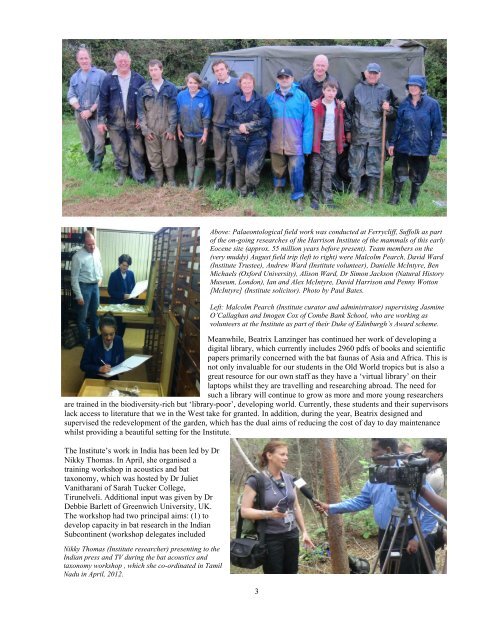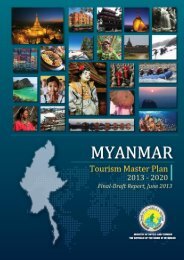Harrison Institute
2011-2012 - Harrison Institute
2011-2012 - Harrison Institute
You also want an ePaper? Increase the reach of your titles
YUMPU automatically turns print PDFs into web optimized ePapers that Google loves.
Meanwhile, Beatrix Lanzinger has continued her work of developing a<br />
digital library, which currently includes 2960 pdfs of books and scientific<br />
papers primarily concerned with the bat faunas of Asia and Africa. This is<br />
not only invaluable for our students in the Old World tropics but is also a<br />
great resource for our own staff as they have a ‘virtual library’ on their<br />
laptops whilst they are travelling and researching abroad. The need for<br />
such a library will continue to grow as more and more young researchers<br />
are trained in the biodiversity-rich but ‘library-poor’, developing world. Currently, these students and their supervisors<br />
lack access to literature that we in the West take for granted. In addition, during the year, Beatrix designed and<br />
supervised the redevelopment of the garden, which has the dual aims of reducing the cost of day to day maintenance<br />
whilst providing a beautiful setting for the <strong>Institute</strong>.<br />
The <strong>Institute</strong>’s work in India has been led by Dr<br />
Nikky Thomas. In April, she organised a<br />
training workshop in acoustics and bat<br />
taxonomy, which was hosted by Dr Juliet<br />
Vanitharani of Sarah Tucker College,<br />
Tirunelveli. Additional input was given by Dr<br />
Debbie Barlett of Greenwich University, UK.<br />
The workshop had two principal aims: (1) to<br />
develop capacity in bat research in the Indian<br />
Subcontinent (workshop delegates included<br />
Nikky Thomas (<strong>Institute</strong> researcher) presenting to the<br />
Indian press and TV during the bat acoustics and<br />
taxonomy workshop , which she co-ordinated in Tamil<br />
Nadu in April, 2012.<br />
Above: Palaeontological field work was conducted at Ferrycliff, Suffolk as part<br />
of the on-going researches of the <strong>Harrison</strong> <strong>Institute</strong> of the mammals of this early<br />
Eocene site (approx. 55 million years before present). Team members on the<br />
(very muddy) August field trip (left to right) were Malcolm Pearch, David Ward<br />
(<strong>Institute</strong> Trustee), Andrew Ward (<strong>Institute</strong> volunteer), Danielle McIntyre, Ben<br />
Michaels (Oxford University), Alison Ward, Dr Simon Jackson (Natural History<br />
Museum, London), Ian and Alex McIntyre, David <strong>Harrison</strong> and Penny Wotton<br />
[McIntyre] (<strong>Institute</strong> solicitor). Photo by Paul Bates.<br />
Left: Malcolm Pearch (<strong>Institute</strong> curator and administrator) supervising Jasmine<br />
O’Callaghan and Imogen Cox of Combe Bank School, who are working as<br />
volunteers at the <strong>Institute</strong> as part of their Duke of Edinburgh’s Award scheme.<br />
3



